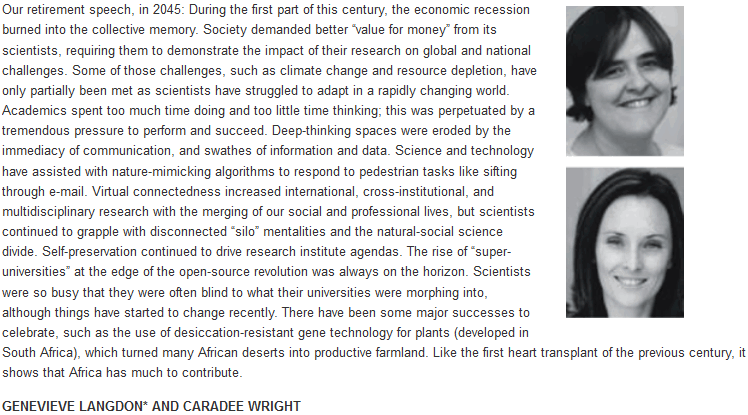|
|
|
|
|
|
|
News & Views item - January 2012 |
![]() Giving the Next Generation of Researchers a Voice. (January 6, 2012)
Giving the Next Generation of Researchers a Voice. (January 6, 2012)
Bruce Alberts, the Editor in Chief of Science takes the opportunity in writing Science's first editorial for 2012 to announce several initiatives that the journal is instituting.
In the hope of stimulating greater interaction between Science and its readership: "Readers can now post comments on all Commentary, News, and Research content immediately after print publication (see www.comments.sciencemag.org/terms). We also welcome Technical Comments that address core conclusions and methodologies, and will publish those as soon as possible (see www.sciencemag.org/site/feature/contribinfo/prep/gen_info.xhtml )."
However, the more significant change is the introduction of NextGen VOICES to combat the tendency to focus overly narrowly on their research field, for example by concentrating on specialised literature searches say through PubMed or Google Scholar.
In Professor Alberts view: "Because innovative breakthroughs often come from the intersection of disparate ways of thinking, scientists need to continually expose themselves to a broad range of disciplines and approaches. They also must work together as a community to build the strong scientific enterprise needed to create the paradigm-breaking innovations," he asks how can Science "promote the wide-ranging conversations that will be necessary to meet these critical challenges?"
Science's approach to fostering the development of the multi-disciplinary groups "is [to provide] a prominent space for young scientists in the front half of the print magazine with a new feature called NextGen VOICES."
As first cab off the rank, in the January 6, 2012 issue of Science the first set of essays from young scientists who responded to the question posed this past October: “How will the practice of science change in your lifetime?” is being made available -- "a selection in print [http://www.sciencemag.org/content/335/6064/36] and many more online ([http://www.sciencemag.org/content/335/6064/36/suppl/DC1.
Professor Alberts assessment of the essays received?: "Many of the essays express a greatly increased need for interdisciplinary, collaborative science—calling for new mechanisms and better incentive systems that promote it... we hope that this new feature will—along with new organizations like the Global Young Academy—help to empower young scientists to play a larger role in both the scientific community and society."
One example of the essays received:

Department of Mechanical Engineering, University of Cape Town, Rondebosch 7700, South Africa.
_______________________________________
If you would you like to make your voice heard in Science? The second NextGen VOICES survey is now open. Science would like to hear your answer to these questions:
What is your definition of a successful scientist? How has this definition changed between your mentor's generation and your own?
To submit, go to http://scim.ag/NextGen_2.
Deadline for submissions is 17 February. A selection of the best responses will be published in the 6 April issue of Science. Submissions should be 250 words or less. Anonymous submissions will not be considered. Please submit only once.